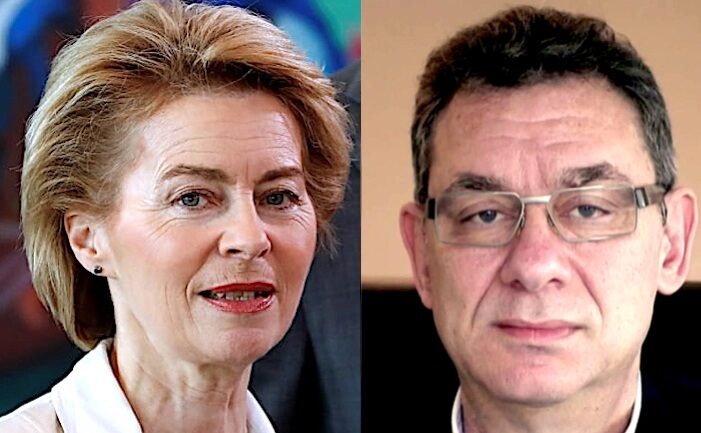
EU-ombudsmanden, Emily O'Reilly, udsendte en formel anbefaling, der fortalte von der Leyens kontor at søge efter og udlevere teksterne i henhold til en anmodning om informationsfrihed indgivet af en journalist.
I april sidste år afslørede New York Times, at EU-kommissionens formand Ursula von der Leyen og Pfizers administrerende direktør Albert Bourla havde udvekslet sms-beskeder og opkald om vaccineindkøb til EU-lande.
Europa-Kommissionens chef brugte 'personligt diplomati' til at sikre aftalen om 1,8 milliarder Pfizer-vacciner via tekster med den administrerende direktør, afslørede avisen.
Journalisten Alexander Fanta fra nyhedssiden netzpolitik.org bad derefter Kommissionen om adgang til tekstbeskederne og andre dokumenter, men den udøvende magt udleverede dem ikke.
Kommissionen afviste anmodningen om informationsfrihed og nægtede at sige, om teksterne eksisterede - selv om von der Leyen selv havde henvist til dem i et medieinterview.
Kommentar: Delvist oversat af Sott.net fra EU watchdog accuses Ursula von der Leyen of 'maladministration'; hand over secret texts sent to Pfizer's CEO to buy 1.8B Covid jabs
According to the ombudsman's inquiry, the Commission did not clearly ask von der Leyen's cabinet to look for the text messages. Instead, the Commission said the only information they had was an email, a letter and a press release.
O'Reilly said:
"This falls short of reasonable expectations of transparency and administrative standards in the Commission. When it comes to the right of public access to EU documents, it is the content of the document that matters and not the device or form. If text messages concern EU policies and decisions, they should be treated as EU documents."The ombudsman said the commission should ask von der Leyen's office to again look for the texts, and if it found them
"the Commission should assess whether public access can be granted to them' in line with EU rules. The EU administration needs to update its document recording practices to reflect this reality."The Commission argued:
"a text message or another type of instant messaging is by its nature a short-lived document which does not contain in principle important information concerning matters relating to policies, activities and decisions of the Commission' and that 'the Commission record-keeping policy would in principle exclude instant messaging. To date, it has not recorded any text messages in its document management system."But O'Reilly rejected this argument, saying that texts fall within the Commission's definition of a document.
Von der Leyen's Commission spearheaded the pre-purchase of Covid vaccines for the 27 EU countries.
More than half the doses the commission has bought or optioned are sourced from BioNTech-Pfizer, making it by far the biggest supplier to the bloc's inoculation efforts.
The commission refuses to divulge key aspects of its contracts with Covid vaccine suppliers, notably on pricing, citing commercial confidentiality.
Last year, there was a mad scramble to secure vaccines, with the EU and the UK coming to blows over contracts with the major pharmaceutical companies.
While Britain was able to get on top of their world-beating vaccine rollout and administer 20 million jabs within a few weeks of the Pfizer and AstraZeneca vaccines being approved, EU leaders lagged behind in implementing a vaccine plan.
Brussels chiefs were furious at AstraZeneca for promising the UK first deliveries of its vaccine supplies, claiming it has reneged on its deal with the bloc.
Countries such as France and Germany then went back-and-forth about whether to rollout the AstraZeneca jab, which sowed doubts among the public and led to a low uptake of the vaccines.
Michel Barnier, 70, later said that ideology, red tape and an aversion to risk-taking led Europe to bungle its early vaccination drive.



Læserkommentarer
dig vores Nyhedsbrev